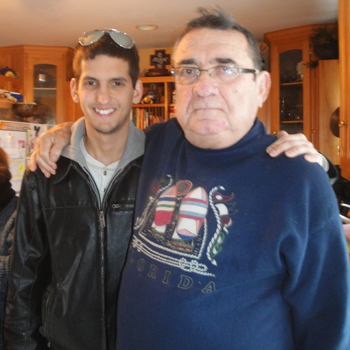By Kendra Sanders
All it takes is one seed to be planted in order to grow something great.
First year, graduate student Luis Sordo Vieira likely received that seed from his grandfather who demonstrated math tricks that fascinated him at a young age.
Now, at the age of 22, Luis has won a prestigious fellowship from the National Science Foundation for his impressive achievement and research proposal in mathematics.
Luis grew up in Venezuela, and later moved to Michigan at the age of 13. “It was rough at first,” explained Luis, “I barely knew how to speak English, so it took me some time in to get used to the language.”
He attended Wayne State University in Detroit, Michigan for undergraduate study, and originally expected to pursue physics. He admitted, “I was a little interested in math from my grandpa, but I was actually never thinking about going into math up until [my] junior year.”
Linear Algebra changed everything; it was the first college course in which he felt challenged, and as a result, he found mathematics to be fun.
In the summer of 2011, following his junior year, he attended NSF’s nine-week undergraduate research summer program at Williams College, where students investigate open research problems in mathematics. Luis was a part of the collaborative research study “Are circles isoperimetric in the plane with density er?” during the same year, which is currently in the preprint stage before publication. Other publications include “Isoperimetric pentagonal tilings” and “Perimeter-minimizing pentagonal tilings,” which were both published in 2012.
Luis and his grandfather - courtesy Luis Sordo Vieria
Upon undergraduate graduation, Luis made the decision to attend the University of Kentucky. When I came to visit,” he said, “one of the things that really enticed me to come to UK was the friendliness of the Math Department. It seemed like I was their student already.”
After arriving at UK and getting his feet wet with graduate life, Luis decided to change his plans of study from mathematical physics to number theory. He is currently working closely with Professor David Leep on number theory, and is laying out his future research in forms in many variables over p-adic fields.
Luis’ future course of study in p-adic fields is what he presented to NSF in a three-part proposal to win the GRFP (Graduate Research Fellowship Program) fellowship. His proposal featured a research proposal of the work he plans to do, previous research experience, and a personal statement. “It was a long shot when I applied for it,” said Luis. But having already asked for his letters of recommendation and completing half of the proposal, there was no turning back. “The funny thing about this fellowship,” revealed Luis, “is that when I got the email for the award, it went to my spam.” Moral of the story: check your spam.
The GRFP fellowship is a five-year fellowship with three years of financial support at $30,000 a year. Luis hopes that this financial aid will allow him to focus on his research as he prepares for the research path down the road in which he plans to apply for a post-doc position and obtain a job at a research university. He also looks forward to teaching. He came into UK with a full-fellowship, but decided to try his hand at teaching during his second semester (Spring 2013). He taught a recitation for Calculus II, and discovered the rewards of being a teacher.
Luis said, “I think it’s fun; it’s a challenge. It’s certainly something that I want to do later on. But right now, I want to focus on my research.” And the NSF fellowship will surely help with that.
Outside of academics, Luis enjoys climbing at the J.C. Center on campus, playing soccer, and playing tennis. Sports provide him with a gateway to relax in the midst of rigorous graduate study. As far as soccer goes, he roots for Real Madrid and Portugal. “My mom’s side of the family is Portuguese,” explained Luis. He also roots for Mexico, where his father’s side of the family has origins. His favorite tennis player is Rafael Nadal, and, ironically, gets told he resembles Nadal’s tennis rival, Novak Djokovic.
Luis will visit the Red River Gorge this summer to try outdoor rock climbing for the first time with his friends. Among his other summer plans are a vacation to Cancun, Mexico and a workshop held at the Mathematical Sciences Research Institute located in Berkley, California. He will work on algebraic topology, and explains that topology is the study of the deformation of spaces where shapes like the circle and square are equivalent. And algebraic topology is the use of abstract algebra to understand those spaces and detect when they are different. “I’m doing it to learn something else,” said Luis. He likes to dive into a bit of everything and learn as much as possible.
Luis also plans to utilize the travel abroad opportunities from his NSF fellowship. He is interested in studying in a Nordic Country as well as Germany, where his advisor, Professor David Leep, often does work.
Luis is fine-tuning a trick of his own—a successful career in mathematics.
